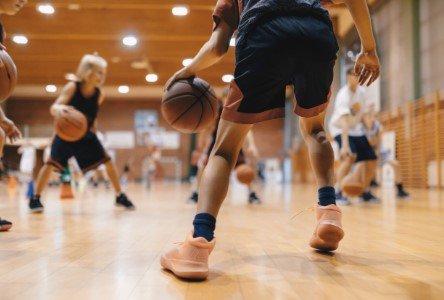Improving Your Skills with Effective Basketball Practice

Regular basketball practice is crucial for anyone looking to improve their skills. Effective practice leads to significant improvements. These improvements include shooting accuracy, dribbling, and teamwork. Additionally, a well-structured training regimen ensures players can maximize their potential. It also helps them achieve their goals. This blog provides valuable tips for enhancing your Basket Ball Practice. It ensures you get the most out of each session. Additionally, it helps you see continuous progress.
Setting Clear Goals
Setting specific, measurable goals is essential for effective basketball practice. Clear objectives help you stay focused and motivated throughout your training sessions. For example, you might aim to improve your shooting accuracy by 10% over a month or enhance your dribbling skills with specific drills. Setting achievable and challenging goals provides a roadmap for your training, making each practice session more purposeful and productive. In addition, regularly reviewing and adjusting these goals can keep you on track and motivated.
Warm-Up and Conditioning
A proper warm-up is vital to prevent injuries and prepare your body for intense activity. Dynamic warm-up exercises, such as jogging, high knees, and jumping jacks, increase your heart rate and loosen your muscles. Moreover, conditioning exercises like sprints, agility drills, and shuttle runs improve your endurance and overall fitness, which are crucial for maintaining high performance throughout the game. A good warm-up also mentally prepares you for the training session ahead, enhancing focus and readiness.
Skill Development Drills
Dribbling Drills:
Ball-handling skills are fundamental to basketball. Consequently, effective dribbling drills, such as cone drills, figure eights, and crossover drills, can significantly improve your control, speed, and agility on the court.
Shooting Drills:
Improving your shooting form and accuracy is essential for scoring. Additionally, practice shooting drills like free throw practice, catch-and-shoot drills, and shooting off the dribble to enhance your technique and confidence.
Passing Drills:
Teamwork and accurate passing are crucial in basketball. Hence, drills like chest passes, bounce passes, and passing on the move help improve your coordination, timing, and precision, fostering better team play.
Strength and Flexibility Training
Strength Training:
Building strength enhances your performance and reduces the risk of injury. Furthermore, incorporate exercises like squats, lunges, push-ups, and resistance training into your routine to build muscle, power, and resilience.
Flexibility Exercises:
Maintaining flexibility is key to preventing injuries and improving your range of motion. Include static stretching, dynamic stretches, and yoga in your training to keep your muscles flexible and ready for action, enhancing overall athletic performance.
Tactical Training
Offensive Strategies:
Improving offensive play involves practicing specific strategies. Additionally, drills like pick and roll, fast breaks, and isolation play help you become more effective in scoring, maneuvering, and creating opportunities on the court.
Defensive Strategies:
Strong defensive skills are essential for a well-rounded player. Practice man-to-man defense, zone defense, and help-defense drills to improve your ability to stop opponents, disrupt plays, and protect the basket.
Team Play:
Communication and teamwork are vital in basketball. Additionally, scrimmages, situational plays, and transition drills are great for enhancing team coordination, understanding roles, and improving collective effectiveness during games.
Cool-Down and Recovery
Cool-Down Exercises:
Stretching the muscles after practice prepares them for a resting session to prevent muscle soreness. Cool-off strategies include light jogging, stretching, and foam rolling to gradually decrease the heart rate and relieve muscle stiffness.
Recovery Techniques:
Recovery is important for more improvement and optimal health of the athlete. Moreover, it is crucial to note that proper nutrition procedures and enough water intake, together with a proper sleeping timetable should not be ignored. Other modalities like taking an ice bath, body massage, and improving on sleeping patterns can also assist in recovery for the next session.
Monitoring Progress
Keeping Track of Performance:
It does help to keep track of improvements made and to set goals for the long run. Moreover, conduct a training journal, performance tracking apps, or a video analysis to check your progress, strengths, and weaknesses and set up new goals.
Feedback and Evaluation:
Coaching and peer feedback are effective means of enhancing oneself through corrections from other people. Accept feedback and self-reflection as a constructive form of criticism. Additionally, being able to learn and grow from the feedback received is a good strategy for working that should be followed religiously.
Mental Training and Motivation
Mental Toughness:
Stress management is another factor since mental strength can help players prepare optimally during a sporting event. Hence, cognitive techniques such as visualization, mindfulness, and positive self-talk can condition the mind and build up coping mechanisms.
Maintaining Enthusiasm:
Practical sessions demand consistency in practice thus trainers need to ensure trainees maintain morale to enable them to achieve good results in the long run. Consequently, keep your motivation up by alternating training sessions, using rewards and positive consequences so practicing stays fun and exciting.
Conclusion
Reaffirm the main strategies that can be employed in basketball practice. Such tips should be encouraged to be practiced in normal practice sessions. Basketball requires effective training, and by adhering to the guidelines indicated above, one is sure to attain his/her potential to the highest possible level of mastery in the game, individual and group performance included.





